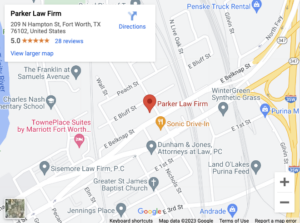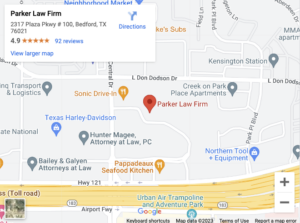
It is disturbing to suffer a car accident, especially if you are injured. It’s worse if someone involved in the accident blames you for the accident and files a lawsuit against you.
Now you have medical, financial, and legal problems to deal with.
The Legal Background
Your liability, if any, depends on how Texas law applies to the specific facts of your case.
Texas Liability Insurance Requirements
How much insurance do you have? Texas requires its drivers to carry at least the following amount of liability insurance:
- $30,000 per injured person;
- A total of $60,000 per accident; and
- $25,000 for property damage.
If three or more people suffer injury in a single accident, they must share the $60,000 in insurance proceeds even though it doesn’t add up to $30,000 per person.
The Texas Car Accident Insurance System
Since Texas is not a “direct action” state, a driver who blames you for an accident must sue you instead of suing your liability insurance company or filing a claim against your liability insurance policy. Assuming that you are covered by insurance, however, it is your insurance company that will actually pay the judgment.
If the damages assessed against you exceed your insurance policy maximum, the opposing party can get a deficiency judgment against you. That means you must pay whatever amount the insurance company doesn’t pay. If you can’t pay it, of course, the debt might drive you into bankruptcy.
Damages
Texas law allows a victorious personal injury plaintiff to win the following types of damages:
- Economic damages: Medical expenses, lost earnings, out-of-pocket expenses, and other easy-to-count losses.
- Non-economic damages: Emotional distress, pain and suffering, loss of enjoyment of life, permanent disfigurement, and other intangible, difficult-to-count losses.
- Punitive damages: Courts will only award punitive damages against you if your conduct is outrageous. Even a DUI accident might not be enough. Texas imposes limits on the amount of punitive damages.
The opposing party might be willing to settle for lower damages than they could probably win in court just to avoid the uncertainty of a trial.
Wrongful Death
If someone dies in the accident, certain close relatives of the deceased can file a wrongful death lawsuit against the at-fault party. Damages tend to be high.
Contributory Fault
The Texas contributory fault allows liability (and damages) to be shared when more than one party is at fault for the accident. If a party is 50% or less at fault, they will lose the same percentage of their damages.
If they were 20% at fault, for example, they will lose 20% of their damages. Any party more than 50% at fault, however, will lose 100% of their damages.
Steps To Take if Someone Files a Lawsuit Against You
If someone sues you for personal injury, observe the following tips.
Don’t Panic
Good judgment is your best legal weapon. If you panic, the opposing party will use your emotional turmoil to take advantage of you or provoke you into a misstep.
Don’t Talk to the Plaintiff or Their Insurance Company Except Through Your Lawyer
Once you hire a lawyer, you can compel the opposing party, including the insurance company, to direct all of their case-related communication through them. You need not speak directly with anyone else about your case unless you are called as a witness at trial or at a deposition.
Contact Your Own Insurance Company
Your own insurance company probably has a clause in your contract requiring you to notify them in case someone files a lawsuit against you. They might also expect you to provide copies of the lawsuit documents (the summons and the complaint).
Carefully Review the Lawsuit Complaint
The typical lawsuit complaint is written in “legalese,” especially if it is not submitted to small claims court. Read it carefully or, better yet, have your lawyer read it carefully and explain its implications.
Collect Evidence
Above all, seek immediate medical help, because medical records are some of the most convincing forms of evidence imaginable. This is critical if you want to file a counterclaim.
You should also obtain a police report or accident report, interview witnesses, and gather photos from the scene of the accident. In a car accident, even the position of dents on your vehicle could serve as evidence.
Aggressively Pursue Evidence Collection During the Pretrial Discovery Process
Once the defendant files a lawsuit against you, they open the door to the pretrial discovery procedure. The plaintiff might:
- Call you or other witnesses for questioning at a deposition.
- Send you written questions that you must answer truthfully.
- Demand that you allow them access to physical evidence, including a medical examination of your body.
- Demand that you allow them to copy relevant documentation.
You can do the same to them. Let your lawyer teach you how to use the discovery process to your advantage.
Don’t Admit Fault
“Anything you say can and will be used against you in a court of law.” Plus, even if you think you’re at fault, you might be wrong.
Stay Off Social Media
The other side will be watching your social media accounts if they can find them. Social media posts are admissible evidence in court.
Prepare Your Defense (and Counterclaim If Applicable)
You might have many defenses available that could reduce your liability to zero or at least limit it. In fact, you might even find a way to turn the tables and hold the opposing party liable for your own damages. You’re going to need an attorney to identify which defenses are the most promising.
Consider Your Settlement Options
Don’t ever forget that settlement is still possible until the moment the court announces its decision. In fact, most personal injury lawsuits end in a settlement.
Seek to open settlement negotiations with the opposing party, and let your lawyer do the negotiating for you. If you reach an impasse, consider calling in a third-party mediator.
Stay Informed and Involved
Keep up with what’s going on in your case; don’t leave it all to your lawyer. There are some important decisions you will have to make, and you won’t be able to make optimal decisions unless you keep up with your case.
Contact an Experienced Fort Worth Car Accident Lawyer
Here is the ultimate tip–don’t try to handle a lawsuit without representation, even if the other side is representing themselves. This is especially important if your claim is not being heard in small claims court, which caters to unrepresented claimants.
Contact an experienced Fort Worth car accident lawyer at (817) 839-3143 as soon as you can after you know that the opposing party has filed a lawsuit against you.


